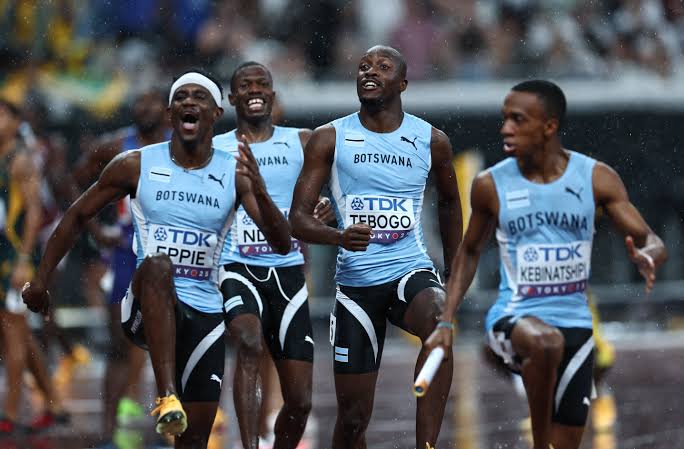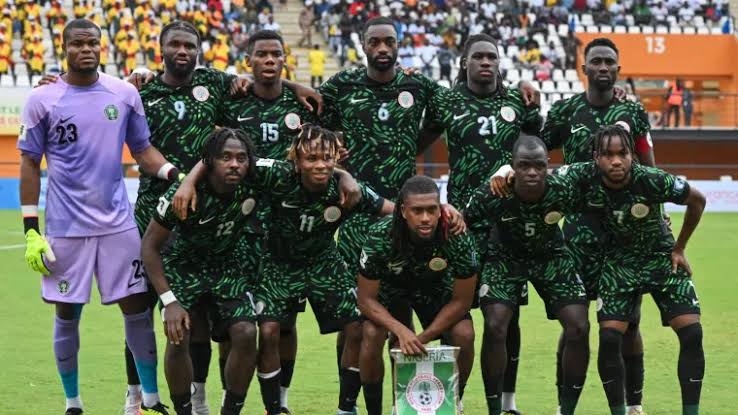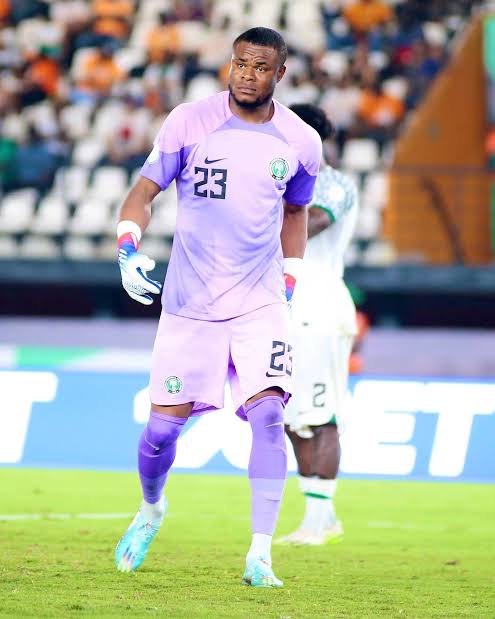By Yusuf Bangura
The 4×400 men’s relay was the most exhilarating event in the just-concluded World Athletics Championships in Tokyo. Before the race started I was 100 percent convinced that Botswana would win it after it succeeded in placing three of its athletes in the final of the 400 metres and one of them won the gold medal. I reckoned that if Letsile Tebogo, the 2024 Olympics 200-metre gold medal sensation, who decided to focus on the 100 and 200 metres in Tokyo, was added to the Botswana team, no country would beat them.
However, it turned out to be a highly competitive race in heavy downpour. The rain was relentless. Each stride on the wet track looked like the athletes were splashing through puddles. Even though Botswana kept pace with the US in the first three rounds, it seemed like the US anchor Rai Benjamin, winner of the 400-metre hurdles in the Tokyo games, was pulling away in the final round from the Botswana anchor man Collen Kebinatship, who won the individual 400 metres, and the South African Zakithi Nene, who was slightly trailing behind Kebinatship.
Nene had been given a big boost by the sensational speed of the 400-metre world record holder Wayde van Niekerk, who substantially reduced the gap between Botswana and South Africa in the third round. Kebinatship of Botswana looked exhausted about ten or fifteen metres to the finish line. The South African, Zakithi Nene, had the momentum. He was generating more wind with his hands on the rain-drenched track. I revised my prediction at that point and had either South Africa or the US as likely winners.
Kebinatship of Botswana and Benjamin of the US looked spent. But I thought Benjamin would hold on to his decent lead even with tired legs. Suddenly, Kebinatship discovered new energy when he felt the South African, Nene, powering to overtake him. His hands moved quicker with more vigour. His strides became longer. Victory was within reach.
With only three or five metres left, Kebinatship successfully held back the South African and, somehow miraculously, overtook the American, whose legs were almost gone. The American had nothing left in the tank as Kebinatship powered past him. America’s decade-long domination of the 4×400-metre relay was broken and Botswana emerged as the first African country to win the event.
It is the most thrilling race that I watched in the 9-day Tokyo Games. It’s up there with the all-time nail biting epics in global athletics. I watched it again multiple times after the race ended. It’s now on my playlist of races I will watch when I want to enjoy heroic races on YouTube.
*From diamonds to athletics?*
Congratulations to Botswana—a nation of only two and half million people! The announcement by Botswana’s president that the heroic athletes will be honoured with a public holiday on 29 September, one day before the country’s Independence Day, is laudable. It is an extraordinary feat that a country of less than three million people has been able to defeat the greatest nation on earth in an event it had monopolised for years. Last year, Botswana also celebrated with a half day public holiday Letsile Tebogo’s triumph in the 200-metre Olympics final in Paris over the American showman and third fastest man in 200 metres, Noah Lyles.
Botswana is generally known as a diamond-rich African country that has avoided the resource curse by managing its natural resources well. Its success for a very long time, way marked by low inflation, high growth rates, low debt, good health services, and high levels of literacy. We saw evidence of its high performance when we travelled round the country in 2024 beyond the often touted macroeconomic statistics. Its road infrastructure was splendid, access to basic services like electricity and clean water was high, and the quality of housing even in rural areas was admirable. With synthetic diamonds driving down the price of natural diamonds and causing a slowdown in the economy, it seems that in future Botswana may be better known for athletics than diamonds.
It has now joined Kenya, and to some extent Ethiopia (which seems to be flagging in long distance races), as the powerhouse nations of athletics in Africa.
*Athletes of African descent dominate global athletics*
Kenya was the top African nation in Tokyo. It was second on the medals table with a total of 11 medals—7 gold, 2 silver and 1 bronze. The US, which placed first, and overwhelmingly led by African-Americans, was impregnable with 26 medals—16 gold, 5 silver and 5 bronze. I must give a shout-out to Kenya’s Faith Kipyegon, the greatest female 1,500-metre runner in history, and winner of three consecutive Olympic gold medals in 1,500 metres. She won gold in Tokyo and has now won four gold medals in the World Athletics Championships. What a feat!
It was good to see that Jamaica, another sprint factory that dominated sprinting for about a decade during the Bolt era, has rediscovered its winning formula after Bolt’s retirement in 2017. It placed 10th, with 10 medals—1 gold, 6 silver and 3 bronze—and won gold and silver in the men’s 100 metres. Remarkably, most of the athletes are under 25. I expect Jamaica to be a great force again in sprinting.
Botswana was fifth on the table with 3 medals—two gold and 1 bronze. Only 53 countries, including 8 from Africa, featured on the medals table. This underscores the point that Athletics is a highly unequal sport. People of African descent dominate it by a mile, although there were a few surprises this year from athletes with no genetic ties to Africa putting up stellar performances in middle and long distance races. I was really impressed by the white British athlete, Amy Hunt, who picked up a silver medal in the women’s 200 metres, beating famous black athletes like Shericka Jackson of Jamaica (the world’s second fastest woman in history in 200 metres), the indefatigable Marie-Josée Ta Lou-Smith of Côte d’Ivoire, and Dina Asha-Smith, Hunt’s British compatriot.
It was a poor outing for Ethiopia, previously an athletics dynamo and high achiever in long distance running. It won four medals—2 silver and 2 bronze, but no gold. It placed 22nd on the medals table. Tanzania went home with only one medal, but it was the right colour—gold, in the marathon. This placed it 19th on the table, above Ethiopia. The other African medalists, Nigeria, South Africa, Algeria and Morocco only had one medal each—silver for Nigeria, Algeria and Morocco; and bronze for South Africa.
*West Africa falls behind*
In years past, West Africa had great promise in sprint events (100, 200, 400, 4×100, and 4×400). Indeed, I once viewed athletics as a sport in which Africa would eventually emerge as the dominant global force—using the comparative advantage of Kenyans, Ethiopians, Tanzanians, Moroccans and Algerians who live in high altitude areas and have developed good lungs to run long distances without tiring; and West Africans, whom legends believe have the right muscle power for short sprints—or what’s scientifically referred to as fast-twitch (Type II) muscle fibres in the hamstrings, buttocks, quadriceps and calves, important for generating force when running.
Unfortunately, West Africa hasn’t taken athletics seriously. It has not developed the infrastructure for high level competition. Most young people prefer football—which provides a pathway out of poverty if they’re lucky to secure contracts with foreign, especially European or Saudi, football clubs. Apart from the hard-working 36-year old Marie-Josée Ta Lou-Smith of Côte d’Ivoire who is always present in the finals of 100 and 200-metre women’s races, and Nigeria’s Tobi Amusan, who holds the female world record in the 100-metre hurdles, West Africans have failed to impress in athletics on the world stage.
The prospects for Africa to dominate global sprinting now rests with Botswana and, perhaps, other Southern African countries—unless Nigeria and, to some extent, Ghana and Côte d’Ivoire, put their houses in order, or the smaller nations learn from what Botswana has been able to do within a short period.
Yusuf Bangura writes from
Nyon, Switzerland
Bangura.ym@gmail.com
22/9/2025





